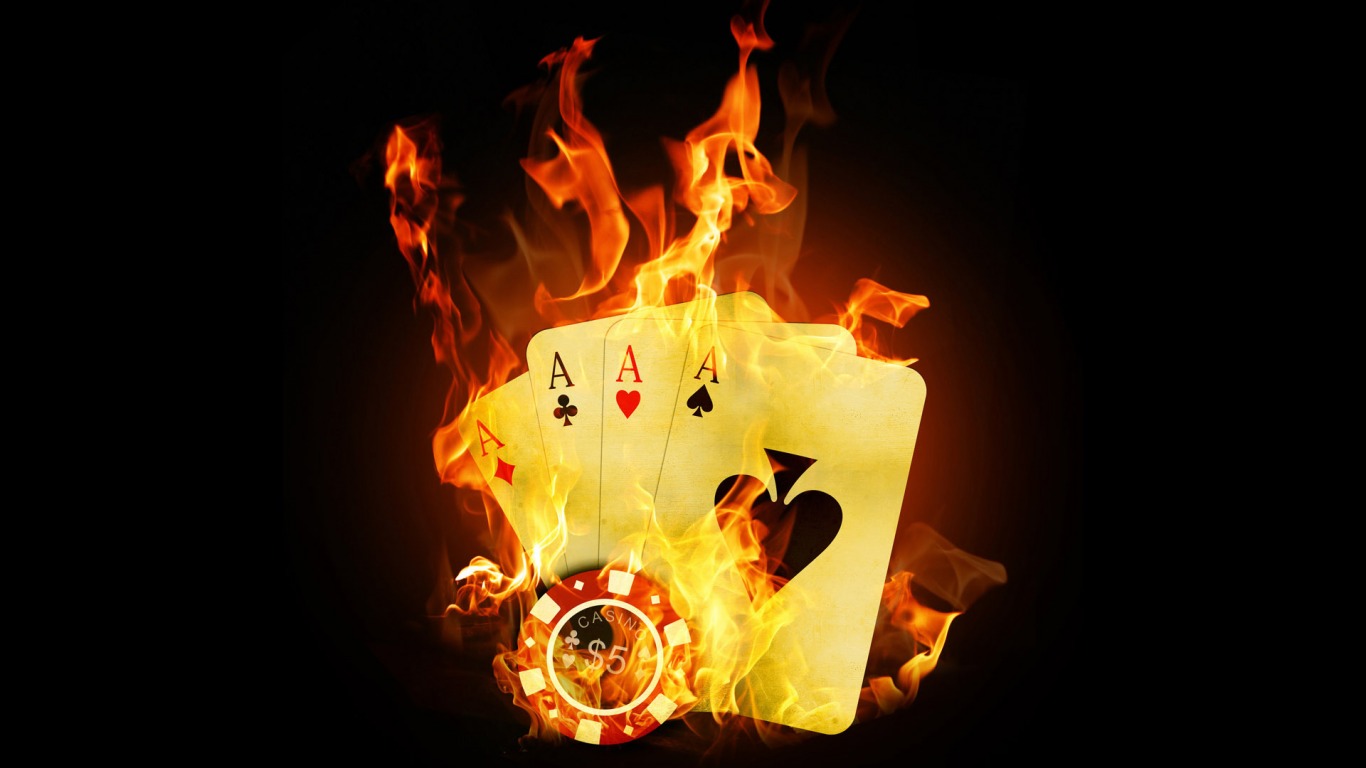
The game when it is deep
This article will deal mainly deep play, preflop and postflop. When we talk about deep stack, we talk about having more than 150BB stack. Below that, you're in your comfort zone.
If you play live and you end up with something like 500BB deep, you will probably be confused, unless of course you do APPLY THEM to the letter that we will tell you in this article.
I do not know how many players play live, but the fact of deep stack play is something quite normal in casinos.
The first thing we will discuss is a basic concept that you can not apply when you play with 100BB or less.
One very important thing when I play deep stack, is that my VPIP will skyrocket. I can play 40/30 for example on a table 6max.
As stacks increase, if you have an edge over your opponents, of course, you have the chance to get more money on each street. The more you are deep, the more you want to do hands as straight or flushes, the hands you want to play for stacks. A hand like top pair no longer be a great hand made 300 deep (unless special situations). You can use it as a bluff-catcher and we'll talk later, but you can not play to stack with this hand. Especially as many players will be able to bluff when they are deep stack. When you want to play when you are deep stack, you want to make a big hand and a big hand is something stronger than 2 pairs.
The relative strength of hands
David Sklansky was already a charter where top pair top kicker could be played for 74BB or less. Of course, all this does not make sense if it is not put into context in the reality of a poker table. I can not tell you that if you have exactly 170 BB and you play against a standard TAG, you should call with 35s on the button, but I can tell you that over the stacks get bigger, you have room for " leveler "your opponents.
The position also will be even more important when you become deep, and I will repeat at least 20 times in this article. You are more deep and you're ready button, you can play more suited connector or hands with good implied odds. You better play like a hand like 56s that KJo. It is only a generalization, but my idea is launched.
If we are 300BB deep, I would not want to make top pair with my J stacker off, and I prefer to do 555 or a straight with my suited connector or a flush. And here is the error that some players do.
Perhaps not necessarily you will often not deep, but with the new tables deep, I think it will be more common for you to be 300BB deep and I hope you will try the stuff we give you today ' Today.
The stack leveling
What I want to do now is to introduce you to a new term as I have used and I will often use later in this article; it is the "stack leveling." The stack leveling is simply the fact of using its chips to come to launch "bullets" on the streets to come. More chips you have, the more you will have the opportunity to launch "bullets. "In this concept, the position is important because you can do what you want the stack your opponent. Pressure we can put on our opponent will be immense if our small bets on the flop involve the streets ahead of other updates. It is not only here because of the caller 3, or 4bet with A9s is also made several updates caller on several streets that you agree to do so. Many people will be more fearful when they are deep stack.
I think the best way to explain this is with an example. Suppose we raise to 3xBB button and we are wedged in the small blind. Our check and we rely on the size of the pot and our opponent calls opponent. On the turn, we rely again on the size of the pot and call our opponent. On the river, we can grow in all. This is the classic way of playing 100BB.
If we play 200BB deep and that our opponent plays the same way in check-call, check-call all the streets, we do not have all his stack. It is here that the stack-leveling begins. If for example the flop our opponent only caller, at worst, if he loses he will lose 100BB hand. By cons, if we check-raise, there is more chance that he plays for 200BB. So when you play 200BB deep and you want to be more aggressive and more action early in the hand to put as soon as possible a lot of money in the pot.Je know people will find it easier to apply the stack-leveling post-flop, but it all starts preflop. That is why I often 3-bet when I'm deep. I 3bet also people who open in late position because I know that these people are generally open light, but I 3bet also to increase the size of the pot.
When you play with 100BB deep, you will be investing in more than 100BB you 3-Bettez because your opponents open a wide évantail hands and you know that your c-bet has a very high efficiency rate. And this way, you can turn the shover shover or even the flop instead of shover the river.
And this is another advantage of 3-better; wedged after your c-bet, your opponents know that the rest of their stack is very lucky to finish in the middle of the table and they will be more looses, they will not fit. And that is why the fact of the better 3-NLHE when you are 100BB deep is so profitable. When you play out of position and you want to take all your opponent's stack, you need to pay attention to c-bet because if you are raised, it is not sure that you will have 3 bullets in your gun to use on all streets.
The difficulty of playing 200BB deep is that you will have to take decisions on street 3 instead of 2. Wedged And after your c-bet, your opponent will have the ability to bluff-raise you on the street to come and you will more difficult decisions to make. If he has position on you, it will restart your c-bet a lot more light to get you the pressure.
That is why the fact of 3-bet out of position can be profitable because you will lead on all streets and you will decide whether or not your opponent will have free maps and it is you who decide how cost the showdown. By cons, and I will repeat it often, you will need to know your opponent. Some players who play 11 or 12 tables will not change their style of play when they are deep. They may not even be the size of your stack will look when they make a play against these players who do not wear a lot of attention to tables, pourez 3-bet often.
Able to identify his opponents
When you play against players who are attentive capable of 3-betting light and you can bluff-raise, you will have 4-bet more, as the stacks get deep.
I would like to clarify something. The hands you want 3-bet against opponents who are often 4-bet hands like AA, KK (obviously) or very strong hands you gain a lot of showdown. But when you have strong hands, without being monsters, and so I included even hands like JJ or TT, you want to be more careful with the 4 bet because you do not want to lose the chance to play these hands.
I think it is terribly important to know. A hand like one pair will lose its value as you will be deep. I can not tell you exactly how your range 3-bet will change when you are deep because it depends very much on the table.
Sometimes I'll even 3-bet hands like 56s if I think it is a good time to do so. Maybe even hands like J4s if I'm not too worried about losing my money and if I think my opponent often lie. You can also increase your ratio of 3-bet bluff, but generally I would say that you will have 3-bet less when you deep when you're out of position.
When we are in position, if we increase our ranks bluff, we can also increase our range of hands to 3-bet for value, for example, hands like KQ can be 3 Bette. And if we do not do that, our 3-bet will become much more transparent and our opponent will be easier to put us on a specific ranks hands. Now, out of position, we will cut off the hands that are 3-bet for value and hands that are 3-bet as a bluff.
I think I'd give another example is 3-bet out of position because I have a lot less likely to 3-bet as I get deep if I'm out of position.
From 300BB deep, against a good player out of position, you should flat caller while your range.
Obviously I think it was an exaggeration, but I'll give you an example because I like to give examples. A friend of mine known to be quite mad and quite aggressive playing the 5/10 which was a lower limit than usual and it should be 400 or 500BB deep on one or two tables. I watched him play and I asked him if 4-bettait sometimes and he told me NO and it suprised me because I thought he was like 4-much better. It bluff by raisait against all flop when he wedged a 3-bet pre-flop.
All flops, bluff-raise.
I think it is a very good example because when you're as deep, it will become very profitable caller as 3-bet to bluff-raise the flop.
I do not know if I'm wrong, but you will probably want to draw your raiser more than your hands all done. For example, if you have a second pair, you'll want to sleep more quickly than if you have a big flush draw or a straight draw big. Everything is a matter of showdown value.
I would also like to give you an example. This is an example that dates back a little over a year. I played 10/20 at the Bellagio and it was a non-capped part while I was pretty deep. I played a hand against a very intimidating player limpait about 100% of its range. So he decided to limp again, another player has raised. I was on the big blind with kings, which is a very nice situation. So I wedged and limpeux decided caller too. Which is fine. I was lucky, the pot was small and I bet about half the pot. He thought for a bit and decided to call. The turning point was check-check and luckily I was able to better value the river and be wedged. And I think at this stage, my opponent had something like an overpair which was smaller than mine.
Of course, I might be able to get a little more money by raising the hand preflop, but if the flop was not as good, I might have disliked my hand and given that we was as deep, I could lose a good amount.
Another thing to say about it is that it will be very difficult for your opponents to you 4-bet out of position when you betterez 3-position and your opponents play very tight in this situation. More you deep, the more you will make money immediately 3-Bettant because people often go hand folder they open, because they open light. Furthermore, when calleront, they check folderont on a very large number of flop. At the level you think it is perhaps not profitable, but when you think on another level, it will be profitable.
In addition to being very profitable, being 3-bet in position accomplish something else. This will give you a clear image in the eyes of the other players at your table and people will see you more LAG than you ever really are. And ending, you say one thing; that there are more important than the open-range of your opponents and their range is their calling-playback-range.
Discuss this article on the forums PokerCollectif: The game when you're deep




